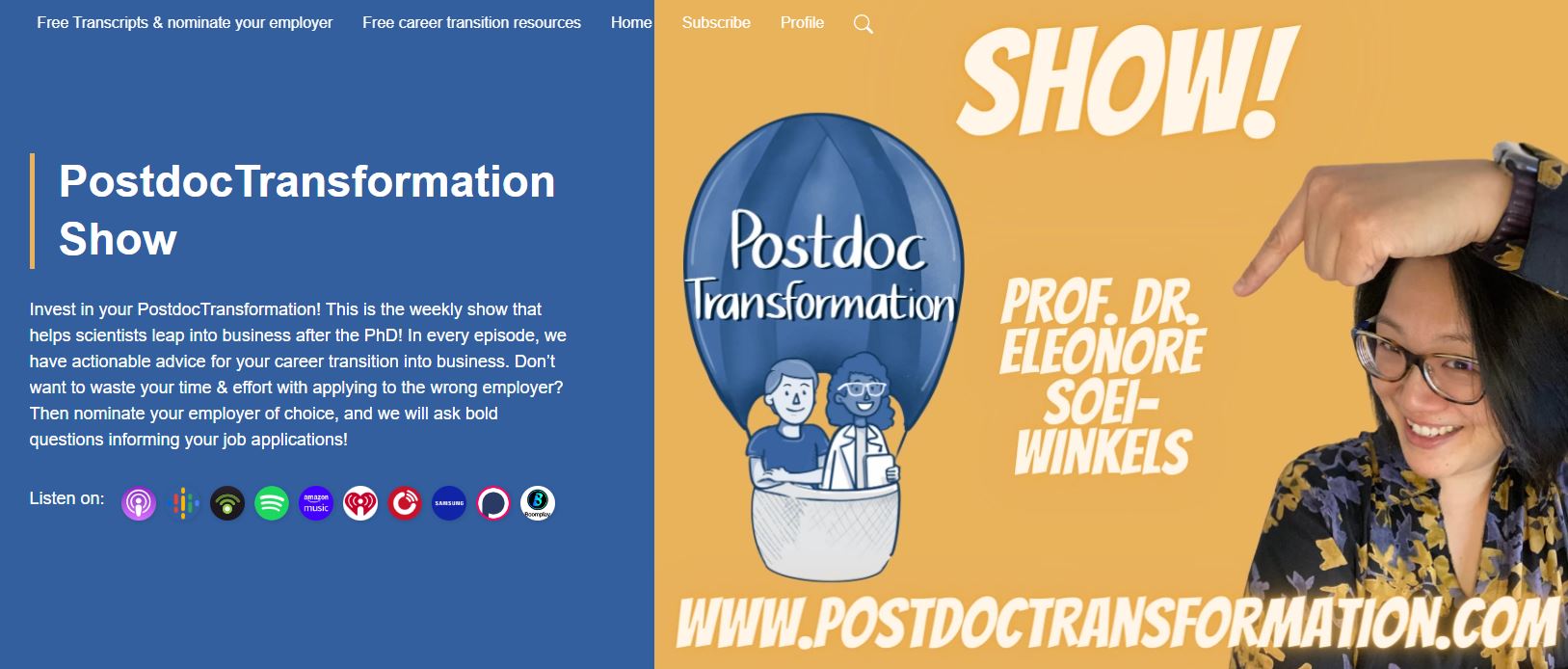
Learn the basics for a career transition from research into business &
get to know companies which hire people with a doctor title!
10 career tips for doctoral students in their final year
Episode 0006 Transcript
0:00
10 career tips for doctoral candidates in their final year
This is a round-up of what I wish I had known during my PhD - but as a 2023 edition! And it has been demanded by some of my listeners, so here we go!
For new listeners, I want to quickly remind on the importance of the vision of life - beyond your doctorate.
Why? Because knowing your vision of life can make you invest wisely into your doctorate in your final year.
If you are unclear about your vision of life, please listen to episode 0001 “How to check your readiness to leap out of science, question nr. 8/15”.
1) Stay focused and disciplined:
Staying focused and disciplined in your final year is crucial to completing your PhD successfully. It can be easy to become overwhelmed by the sheer amount of dissertation-related work that needs to be done, but setting realistic goals and deadlines for yourself can help you stay on track. Break down your work into manageable tasks and make a schedule that works for you. Capitalize on your research & teaching experience: Can you batch or cluster similar or related activities, so that you can reduce ramp-up and -down times? Do you know, at what times of the day or week you can do deep vs. light work.
It's important to avoid procrastination and distractions, as they can eat into your productivity and make it more difficult to meet your deadlines. Try to eliminate distractions by turning off your phone, logging out of social media, and finding a quiet workspace where you can focus on your work.
Making steady progress towards your goals is also important. Even if you can only work on your dissertation for a few hours a day, make sure to use that time effectively. Here’s my tip that I share with all my bachelor and master students in real life: Plan only 80% of your time budget, so that you have wiggle room for doing unexpected things and to avoid burnout. And as a leader, do the same, your team will be grateful and work happily for you.
But back to your dissertation: Don't put off tasks until the last minute, as this can lead to a lot of stress and anxiety. Reverse engineer your schedule towards a certain goal from the deadline backwards.
By staying focused and disciplined, you'll be able to meet your deadlines, produce high-quality work, and finish your PhD with confidence. Remember, it's the discipline and focus you cultivate during your PhD that will help you succeed in your postdoctoral career and beyond.
2) Seek feedback regularly:
Here’s my warning, which I also share with my bachelor and master students in real life: Whether you get constructive feedback depends on the agenda of your feedback giver.
If you are a threat for that person, you won’t get any or just unhelpful or even toxic feedback.
As a PhD student, seeking feedback regularly is one of the most important practices to adopt. Feedback is essential for successful completion of your PhD program as it helps you to identify areas where you need to improve and make necessary adjustments. This can help you to avoid mistakes and improve the quality of your research. There are several ways to seek feedback, including from your supervisor, peers, or other experts in your field.
Your supervisor is your primary source of feedback as they are responsible for guiding your research project. They can provide constructive criticism and guidance on how to improve your work. It is important to maintain open communication with your supervisor and to seek feedback regularly. You should also be receptive to their feedback and take it into consideration when making revisions.
Peers and other experts in your field can also provide valuable feedback. Attending conferences or workshops where you can present your work and receive feedback from other researchers can be very helpful. This can give you the opportunity to get feedback from a wider audience and to gain insights from experts in your field. It can also help you to build connections and collaborate with other researchers.
In conclusion, seeking feedback regularly is an essential practice for PhD students. It helps you to identify areas where you need to improve and make necessary adjustments, and can ultimately help you to produce high-quality research.
Again, avoid toxic leaders. They only serve themselves. However, even if you are lucky to have good leaders, I encourage my bachelor and master students in real life to become independent of feedback ASAP, so that you don’t have to rely on luck.
Remember, you are too smart to be bossed around!
3) Network strategically:
Networking can play a critical role in your academic career, both during your PhD and beyond. One of the keys to effective networking is to start early, so you have time to build strong relationships with other researchers in your field. Begin by identifying key researchers whose work aligns with your interests, and make an effort to connect with them.
Attending conferences is an excellent way to meet other researchers and learn about the latest research in your field. Make sure to take advantage of opportunities to network at conferences, such as attending social events or participating in poster sessions.
Joining professional societies is another way to build your network. These societies often have events, workshops, and other activities that can help you connect with other researchers in your field. You can also consider volunteering or serving on committees within these organizations to expand your network and develop your skills.
Finally, remember that networking is not just about building a large number of contacts. It's also about cultivating meaningful relationships with other researchers who can provide advice, support, and opportunities throughout your career. By networking strategically, you can build a strong and supportive community of colleagues who can help you achieve your academic and career goals.
If you want to dive deeper I also discuss this in my free email course “Career transition into business made simple” and episode 003 “Ten steps to transition your career into business”.
4) Start thinking about your post-PhD career early:
It's never too early to start thinking about your post-PhD career. In fact, the earlier you start, the better prepared you will be to pursue the opportunities that interest you most. That’s why I am so happy that even Master students from all over the world are following me on Instagram (@postdoctransformation).
One of the first steps you can take is to start exploring different career paths that align with your skills and interests. Attend career fairs and conferences, and check out job postings to get a sense of the skills and experiences that employers are looking for.
Once you have identified potentially non-linear career paths, start reaching out to professionals in those fields to learn more (for example on LinkedIn (see also episode 0003 “How to transition your career into business”). Request informational interviews to gain insight into the day-to-day work and challenges of their roles, as well as the skills and experiences they found most valuable in their careers.
You can also consider participating in internships (that depends on the country, whether that is possible) or other experiential learning opportunities to gain hands-on experience in your desired field. These experiences can help you develop the skills and connections you need to succeed in your post-PhD career.
Finally, make sure to build a strong professional network throughout your PhD program. Connect with colleagues, mentors, and professionals in your field through conferences, social media, and other networking opportunities. These connections can provide valuable support and guidance as you navigate your post-PhD career.
By starting early and taking a proactive approach to career planning, you can position yourself for success in your post-PhD career.
Another related episode is 0004 “The future of work for new PhD holders in business”.
5) Develop transferable skills:
Do you know yours? Well, I also mentioned them in episode 0001 “How to check your readiness to leap out of science”.
While technical skills are essential for success in your field, developing transferable skills is equally important. Transferable skills are skills that can be applied to a wide range of situations and careers, such as communication, project management, and leadership.
One way to develop these skills is by seeking out opportunities to practice them. For example, if you have the opportunity to teach a course or lead a project, take advantage of it. These experiences can help you build your communication and leadership skills, as well as your ability to manage complex tasks and work effectively with others.
Volunteering can also be an excellent way to develop transferable skills. Nonprofit organizations often need volunteers to help with tasks such as event planning, fundraising, and outreach, which can provide opportunities to develop project management, communication, and leadership skills.
Finally, don't overlook the value of workshops, courses, and other training opportunities in developing your transferable skills. Many universities and professional organizations offer courses in communication, project management, and other key skills that can help you succeed in your academic and professional life.
By developing transferable skills, you'll be better equipped to navigate the many challenges and opportunities that will arise throughout your career. These skills can help you become a more effective communicator, leader, and problem solver, which will be valuable no matter where your career takes you.
6) Publish your work:
In other words, finish what you want to leave. And I also discussed this in episode 0001 “How to check your readiness to leap out of science”.
Publishing your research is an essential part of establishing yourself as a researcher and advancing your career. It demonstrates your expertise in your field and can open up opportunities for collaboration and funding.
When preparing to publish your work, start early and work closely with your supervisor or mentor. Together, you can identify the most appropriate journals or conferences for your research and develop a strategy for preparing and submitting your manuscripts. Remember, a business recruiter or hiring manager, your future leaders in business won’t be able to appreciate the impact factors etc.
Make sure to carefully review the submission guidelines for each journal or conference you are considering, as they can vary significantly. Pay close attention to formatting requirements, citation style, and word limits.
In addition, consider seeking feedback on your manuscript from colleagues or other researchers in your field. This can help you refine your ideas and improve the quality of your writing.
Remember that the publication process can be lengthy, so be prepared for potential delays or rejection. Don't be discouraged if your work is not accepted on the first try; use the feedback you receive to revise and improve your manuscript for future submissions.
By publishing your work, you can establish yourself as a respected researcher in your field and increase your chances of success in your academic career.
This being said, if you plan to leap into business after your doctorate, you can rather relax. Yes, you will have psychological closure if you publish everything and leave science thereafter. But essentially, most business recruiters can’t and won’t appreciate your research publications, especially, if you apply for a job unrelated to your research.
So, think about, how you can invest into your doctorate according to your vision of life?
Your first first author paper will be the hardest and you should celebrate this in style. Print it out, keep the PDF forever, take a picture of the journal with your article visible in your hand.
I only have digital access to mine, so recently I did a screenshot and have it now on my mug, LOL.
7) Attend conferences and workshops:
Attending conferences and workshops is an essential part of professional development for doctoral candidates. These events provide a unique opportunity to meet and network with other researchers in your field, share your research, and learn about the latest trends and developments.
To make the most of these events, it's essential to plan ahead. Look for conferences and workshops that align with your research interests and professional goals, and make sure to register early to take advantage of early bird discounts and other perks.
Consider presenting a poster or giving a talk at the conference to showcase your research and receive feedback from other researchers. This can be a valuable experience that helps you refine your ideas and improve the quality of your work.
In addition to presenting your research, make sure to attend other sessions and workshops that interest you. Take advantage of opportunities to learn about new techniques and approaches in your field, and connect with other researchers who share your interests.
Finally, don't forget to take advantage of the networking opportunities at these events. Connect with other attendees and presenters, and exchange contact information to stay in touch after the conference. These connections can lead to valuable collaborations, mentorship opportunities, and job offers down the road.
Attending conferences and workshops is a valuable investment in your professional development and can help position you for success in your postdoctoral career.
Check out your free business card template in your free email course career transition made simple!
While we are on the topic of networking, let's connect! We would like to know about your thoughts and your Aha moments of the show and this episode specifically!
8) Apply for funding and awards:
As a doctoral candidate, applying for funding and awards can be an excellent way to gain valuable research experience and establish yourself as a leader in your field. Funding can help support your research, cover conference travel costs, and provide valuable networking opportunities.
To find opportunities for funding and awards, start by talking to your supervisor or departmental advisors. They can help you identify relevant funding sources and provide guidance on preparing a strong application. You can also search for funding opportunities through online databases, professional societies, and grant agencies.
When applying for funding or awards, it's essential to carefully review the application guidelines and requirements. Make sure to tailor your application to the specific funding opportunity, highlighting the relevance of your research and your qualifications.
Additionally, make sure to emphasize your achievements and accomplishments to date. This includes your research publications, conference presentations, and any relevant volunteer or teaching experiences.
Remember that applying for funding and awards can be a competitive process, so make sure to prepare a strong application and give yourself plenty of time to gather all necessary materials.
Overall, applying for funding and awards can be a valuable investment in your research and professional development. It can help you gain valuable experience and establish yourself as a leader in your field, positioning you for success in your postdoctoral career.
And talking from a business perspective, this also builds your business acumen, as you will be responsible to manage the awarded funding. And if you are able to report your research outcomes to the public, this will also sharpen your scientific communication and public relation skills.
And did you know that I offer deep dive courses, workshops and memberships at graduate school, maybe also at yours in the future, as your graduate school coordinator, whether they want to book my services so that I can deliver them to you 24/7 365 on your mobile device.
You want our e-courses at your grad school? Get your grad school book our services (applies only to first-time bookings), and you'll earn a recurrent 50% sales commission!
9) Consider alternative career paths:
This is hopefully no surprise, LOL, we create weekly content for you, so you can manage your PostdocTransformation!
While an academic career may be the most traditional post-PhD path, it’s also the less common one.
So, it's essential to consider alternative career paths that align with your skills and interests. There are many rewarding career options outside of academia, including industry, government, nonprofit, and entrepreneurship.
To explore alternative career paths, start by attending career fairs or networking events. These events can provide an excellent opportunity to meet professionals in different fields and learn more about their career paths. You can also reach out to alumni from your program or professionals in your desired field for informational interviews.
When exploring alternative career paths, make sure to consider the skills and experiences required for success in each field. For example, if you're interested in industry, you may need to develop skills in project management, teamwork, and communication. Similarly, if you're interested in government, you may need to have experience with policy development and analysis.
Remember that exploring alternative career paths can take time, so be patient and persistent. Consider taking on volunteer or internship opportunities in your desired field to gain experience and make valuable connections.
Overall, considering alternative career paths can expand your career options and help you find a fulfilling career that aligns with your interests and values. Don't limit yourself to academic careers, and explore the many exciting career opportunities available to PhD holders.
Again, listen to episode 0003 “How to transition your career into business”, if informational interviews are unclear to you.
Season 2 of this PostdocTransformation show will feature informational interviews for your orientation! Do you want me to interview somebody, whose role is interesting for you? Let us know and we can reach out to that person!
Click to see, how we will set the personal branding stage for your role models!


















